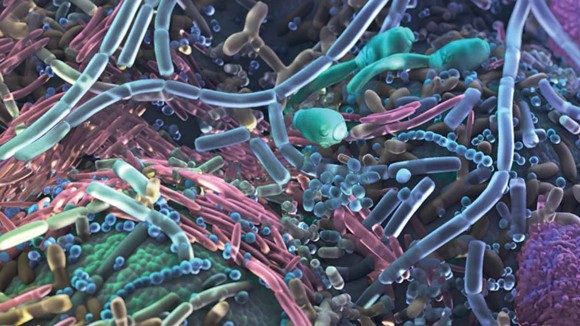In my previous article, I have explained about what the microbiome is, here, lets talk about some benefits of the microbiome!

Image obtained from Nature.com (https://www.nature.com/collections/fiabfcjbfj)
It provides some essential nutrients:
- Vitamin K: This is essential for responding to injuries by regulating blood clotting. It is also helpful for bone health as it reduces bone loss reducing the risks of fractures. It also prevents calcification of arteries and other soft tissues.
- Vitamin B12: It helps to keep the body’s blood cells healthy, helps make DNA and genetic materials and helps prevent anaemia.
- Vitamin B2: It helps is energy production, acts as an antioxidant, fights free radicals and maintains a good vision.
Microbial antagonism:
Using this mechanism, our own commensal microbes fight with pathogens for nutrients in the body by blocking attachment sites for pathogens. The commensals utilise all the nutrients creating a deficiency for the pathogens. The commensals also produce H2O2 (anti-bacterial) making the environment unfavourable for the pathogens.
Immune Stimulation:
The presence of commensals always keeps the immune system active (i.e: in an alert mode). It is often observed that the immune system of germ-free animals is underdeveloped. The microbial signals also prevent immune-over-activation and the immune system only reacts if it is encountered by a pathogen.
But, as everything in this world has its pros and cons, these bacteria have some detrimental effects as well.
Opportunistic:
As discussed in the previous article, the commensal bacteria may become opportunistic and turn into pathogens. For example, Streptococci may cross the oral epithelium, enter the blood stream and cause heart colonisation leading to infective endocarditis.

The Gut Microbiota while promoting immunity may also trigger auto-inflammatory diseases as well as causing obesity, cancer etc. The microflora may also contain antibiotic resistance genes. So, the commensals may develop antibiotic resistance and may transfer the resistance genes to other pathogens. For example, your commensal E.coli may transfer its resistance genes to a pathogenic Salmonella which may cause Salmonellosis.
Hence, it becomes very important to have a good microbiome. Scientists have not completely discovered all the functions of the microbiome but I am sure they are going to be far more interesting and surprising! If you are interested, do read about the Human Microbiome project!

An interesting read!
LikeLike
Thank you!
LikeLiked by 1 person
Interesting!
LikeLiked by 1 person
Thanks!
LikeLike
Thoughtful post …would live to read more
LikeLiked by 1 person
Glad to hear that!! Thank you
LikeLike
very informative and detailed article
LikeLiked by 1 person
Glad you liked it!
LikeLike